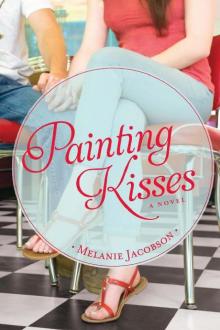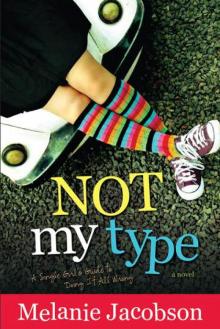- Home
- Melanie Jacobson
Kiss Me Now: A Romantic Comedy Page 4
Kiss Me Now: A Romantic Comedy Read online
Page 4
“I’m going to grab some water,” I said. “Can I get you some?”
“Sure, that would be great.” But when I walked into the kitchen, he followed me instead of waiting for me to return. I stifled a sigh and filled a glass for him from the dispenser in the fridge door. It was shiny and black, a sharp contrast to the beige and brown oven, but Uncle Fred’s fridge had failed shortly after I’d moved in, so I’d replaced it with a new model.
“Haven’t tackled anything in here yet, huh?”
“Brilliant deduction.” Then, feeling petty for being sarcastic when he’d been helping me all morning, I tried again. “Eventually, I’ll upgrade everything in here, but the kitchen is my lowest priority. It’s the biggest project, and I’ll have to contract out.”
“Expensive too.”
What was it with this guy and his constant comments on the cost of things? “Yeah. It’s not just that. My mother was constantly remodeling rooms in our house growing up, and I’ll survive a kitchen remodel better if I have places to escape to in the rest of the house. Sometimes you need to get away from the workers and the dust and noise. I need to get through this first school year and do this next summer when I’m off and I can supervise.”
I handed Ian his water and turned my back on the kitchen in favor of returning to the dining room and admiring my progress again. It was coming along. Good little sander. Totally worth the rental. Except...I crouched to examine the sandpaper.
Ugh. It was wearing thin and needed changing. I bit back a mild curse. Well, it looked like I might need Ian’s help after all. I glanced over my shoulder to see if he’d come in from the kitchen and found him leaning against the doorway, studying me.
“What?” I asked.
“Everything okay with the sander?”
“No. I have to switch the paper out, and I think it’s going to be a two-person job.”
“Happy to help.” He set down his glass and walked over. “Haven’t worked with a floor sander before. Do you know how to do this?”
“I think so. I have to turn it over to switch it out. I was kind of hoping you would do the turning over part.” It was a heavy machine. It had taken both Grace and I to get it into the house this morning.
“I got this.” He gave me a cheeky bicep flex. “They don’t call me Muscles for nothing.”
I didn’t smile, instead letting my gaze slip away and mumbling something about getting the new sheet. His arms were annoyingly impressive.
I fetched the sandpaper from the foyer where I’d left the box sitting beside the front dining room entrance. Library entrance. I was allowed to call it by its new name.
I dawdled while pulling out the new sheet. Ian had been poking fun at himself with the flexing, and I’d always gone for brain over brawn, but something about the way the cotton of his worn blue T-shirt had pulled over his arms had made my cheeks warm. I needed a second to collect myself. I’d been man-deprived for a long time, but I wasn’t fixing the problem with Ian.
When I walked back into the library, he had the sander flipped over on the floor.
I crouched beside him. “I think we loosen that circular nut from the plate, pull off the old sheet, and put the new sheet on.”
“Let’s do it.”
I took a stab at it, but it wouldn’t budge. I frowned and tried again. “Righty-tighty, lefty-loosey, right?” I asked.
“Yeah. Want me to try?”
“No, I got it.” But after a few more attempts and a very sore thumb and index finger, I conceded that I did not, in fact, “have it.” “All right, I need to go find my wrench.” I wasn’t sure which tool I would need for the job, but so far, plunking down my toolbox by everything I’d had to fix then pulling each tool out one by one and holding it up to the problem had helped me repair a lot of things in the house.
I climbed to my feet and headed for the laundry room where I kept the toolbox on the washing machine. It was as good a place as any to keep it since the washer didn’t work. I’d been using it to store cans of sample paint and washing my clothes at Miss Lily’s house.
I stared at the tools for a while, picking them up and considering each before I settled on the three I thought would most likely suit the job, but when I returned to the dining—library, Ian was sitting beside the sander with the used sandpaper in his lap.
“You got it,” I said, annoyed with myself for being relieved that I wouldn’t have to figure it out after all.
“I did.” But he looked sheepish. His bangs were almost long enough to fall into his eyes, like he was overdue for a haircut, and he brushed them out of the way. “There may have been a complication.”
“What kind of complication?”
“When I pulled out the screw, it slipped and rolled away. I was about to look for it.”
I scanned the floor. “Which way did it roll?” A silver screw wouldn’t be too hard to spot, unless...
Ian pointed to the thick sawdust coating the sanded area. “That way.”
“Of course it did,” I muttered. Rule one of home improvement was that nothing ever went right, and rule two was that it always went wrong in the least convenient way possible.
“Sorry about that. Don’t worry, I’ll find it.”
I glanced down at my watch. “It’s lunchtime. You’re off the hook. You can report to Miss Lily that you’ve done the time. I’ll sweep up the dust and find the screw.”
“No, really I—”
“You’ve done enough,” I said, keeping my voice even. It was no surprise to discover I’d have been better off switching it out by myself the hard way. Story of my life.
“I’ll find it.” He tugged off his sneakers.
“What are you doing?”
“I’m going to shuffle through it barefoot. That’s how I’ll find it.”
A smile tugged at my lips in spite of myself. I had to give him points for trying. “All right. You start at that end doing it your way,” I pointed to the far corner, “and I’ll start at this end doing it mine.”
“What’s your way?”
“Don’t worry about it.” I fetched the shop broom from the laundry room and smirked when his eyebrows rose and looked from the short-handled broom I’d given him to the full-sized broom I now carried. But neither of us said anything as we set to work, him carefully stepping barefoot across the sawdust, me sweeping it up in short, brisk strokes as I watched for the screw.
“Have you done all the renovations yourself so far?” he asked after a minute.
“Yes. That’s why it’s going so slow. I do a lot of things the hard way first.”
“It looks good,” he said.
“You don’t know what it looked like before.”
“Do I need to have seen it to think that it looks good now?”
I rested against the broom handle. “I guess not. But you’d know how far it’s really come even if it feels like it’s taking forever most weeks.”
“Are you on a deadline or something?”
I shook my head and went back to sweeping. “No. I’m just the impatient type, I guess.”
He shuffled a few more steps before asking another question. “Were you close to your uncle?” Puffs of dust rose with each step.
“Not until shortly before he died.” Uncle Fred had been so good to me, giving me a place to live for a little while. When I was young, he’d kept a squirrel feeder in his backyard that had delighted me with its constant traffic on my visit, and each year on my birthday, he’d sent a card with a squirrel on it, a crisp twenty-dollar bill tucked inside with a note to spend it stocking up on nuts.
Maybe that was why I’d thought of him when I’d found myself with a sudden desperate need to escape from DC and the scandal erupting around me. He’d been kind enough to offer me shelter from the storm, no questions asked.
I went back to sweeping, but Ian, unlike Uncle Fred, was chock full of questions.
“He didn’t have any kids?” he asked.
“No.”
“Nice of him
to leave his place to you.”
That wasn’t a question, so I didn’t answer. He really was nosy. Must be a job hazard. He drew a breath like he was about to ask another question, but since they all seemed focused on my past and that was my least favorite topic, I decided to change the subject to him.
“So how’d you get into detective work?” I asked. “That’s what you do, right?”
“I guess you could call it that. That makes me think of police though. My work is...messier than that.”
“Messy how?”
“I don’t have to follow the same rules.”
I stopped sweeping again. “That doesn’t sound at all ominous.”
He laughed, revealing straight white teeth. He had Miss Lily’s smile. “I’m one of the good guys.”
“Are you though?” I’d dealt with my fair share of high-powered law firms. “Fair” wasn’t a word I would use to describe their tactics or their results.
“The people I investigate don’t think so. But my work probably wouldn’t bother them so much if I weren’t always catching them misbehaving.”
“You still didn’t say how you got into your line of work. And why do it for a law firm? Why not the FBI or CIA? Don’t most guys with a sense of duty end up working for the intelligence services? Although maybe you’re not that into duty.” It still annoyed me that he made his grandmother pine for his visits so often.
He stopped shuffling. “What makes you say that?”
“I’ve met Landon and the other grandchildren several times, but this is the first time I’ve seen you come around.”
“My job is demanding,” he said, sending up an extra big puff of sawdust. “It’s harder to get away.”
“That’s interesting, because Landon still managed to make it out to spend a Sunday afternoon with Miss Lily, and I think he’s a first-year associate and therefore has no life outside of the firm, right?”
He didn’t say anything to that. Finally, he said, “I went to law school.”
“Excuse me?” What did that have to do with his delinquent grandson status?
“You asked why I worked for the law firm instead of going into law enforcement. It’s because I went to law school at Georgetown and got hired by Fleming, Roth, and Schill.”
I knew who they were. I’d even had some dealings with them in my old job. Ian must have been top of his class to get hired as a first-year associate.
“But you don’t work for them as a lawyer, so...”
“I discovered the part I liked best about the job was the research. I didn’t like having to recruit new clients. I hated preparing briefs and motions. But the research? I could do that all day. And the most fun was when I got to work with the firm’s investigator to track down reluctant witnesses or clear up fuzzy details in their statements. So I decided to do all the fun parts of the job and skip the paperwork.” He tilted his head and met my eyes. “Did I mention I’m very good at what I do?”
It sounded less like a brag and more like...a warning? I had no idea what he was trying to warn me against, but it didn’t matter. He wasn’t interrogating me anymore, and that was all I’d been after.
A grunt from Ian drew my attention as he bent down and fished something from beneath his foot. “Found it,” he said, straightening and holding it up, a slight wince on his face. I only sort of hoped it had found the soft part of his sole.
“Thanks,” I said, going to fetch it from him. “I’ve got it from here. I could point you to my first-aid kit, but I have a feeling Miss Lily would enjoy fussing over you, so why don’t you go on back and let her take care of your foot?”
I stooped to secure the new sandpaper to the sander. He was silent for a moment, then offered a quiet, “Bye” as he fetched his shoes and socks and padded out the front door. I didn’t answer him.
It was a poor demonstration of the manners my mother had drilled into me since childhood, but his explanation of his job had finally clarified the uncomfortable feeling I’d had since he’d shown up: he was part of the establishment machine that had chewed me up and spit me out, broken, two years ago.
I’d left people like him behind for a reason, and I didn’t like him popping up in my peaceful Creekville bubble. Since moving in, I’d wished for Miss Lily’s sake that the prodigal grandson would drag himself home, but now I couldn’t wait until he disappeared again.
He’d have to head back tomorrow, probably after Sunday dinner, if Miss Lily could convince him to stay that long. Miss Lily and I had taken to eating Sunday dinners together with Mary lately, but I would plead a headache tomorrow and make it up to Miss Lily later. It wouldn’t even be a lie, because that’s exactly what Ian was: a headache I couldn’t wait to be rid of.
Chapter Five
Ian
I hobbled home, gave my foot a good wash, and dabbed on some antibacterial junk. I’d gotten some interesting wounds “in the line of duty” as an investigator, but I wasn’t so sure this one would pay off in the end like others had. I’d gone over to Brooke’s this morning with a determination to fill the giant gap in her online history, and I hadn’t left with any more information than when I’d arrived.
I settled back on the guest bed and pulled out my laptop to review her file, a list of links to all the places I’d found her digital footsteps. Her social media hadn’t told me much. The last few months, she’d mostly documented her renovation and gardening projects, no mention of anything personal. Even prior to that, her pictures were largely of places and things, not people. She took pictures of buildings she found interesting, sunsets, and lots of plants and flowers.
Her Linked-In profile told me far more, but mostly because of what it left out. I’d started at the beginning, which was simply a mention of high school. Based on her graduation date, I was correct about her age. She was thirty. It didn’t take long to find a copy of the yearbook one of her nostalgic classmates had scanned into a McClean High School Class of 2009 Facebook group. McClean, Virginia was one of DC’s most affluent suburbs with McMansions occupied by top military brass and actual mansions owned by foreign ambassadors and DC lobbyists.
So she had come from money. Or at least from a solidly upper middleclass upbringing. Interesting. How did she go from that to scamming?
Her senior portrait listed her activities beneath it. Model UN, Key Club, class secretary, National Merit Scholar, president of Girls in STEM. I traced her to college at UVA. We would probably have overlapped on campus by about a year. Not that I expected to have crossed paths with her at a college of 21,000. She’d been in a sorority, one more noted for service than partying. She’d taken an extra semester to graduate then joined a public policy think tank in DC. She’d stayed there a year then worked as a staffer in the office of her representative to the Virginia legislature for two more. Next came her credential program and her new job as the biology teacher at Lincoln High School.
But it was the three blank years between her job at the delegate’s office and her teaching credential that interested me most. That hole suggested someone who wished to forget or hide a significant part of her life. Those were always, always the very most interesting and telling parts. Especially because her stay with her uncle, Fred Sandberg, fell during that window. So why was it unaccounted for in all her public profiles?
On paper, her education and career would lead me to expect a polished Virginia socialite, not the woman who had opened her door this morning in denim overalls, her light brown hair in two braids with a fine film of sawdust clinging to it. But then, I’d seen a glimpse of that socialite last night in her ease with Gran, comfortable in her gathering room and at her table, etiquette on point, not remotely overawed by the subtle luxury of her surroundings.
What is hiding in that job gap, Brooke Spencer?
I’d know soon. Last night I’d only begun to search. Today began the dig.
I opened my email and sent my first message to ferret out the secrets she wasn’t telling. By the time I drove home Sunday night, I knew which threads
to pull.
Monday morning, I called in my assistant, a middle-aged woman named Sherrie who’d joined the firm as a paralegal but had been bitten by the same bug that had drawn me to investigation. She was turning into a skilled investigator in her own right. Her self-described “average mom vibe” made it easy to fly under everyone’s radar, from hotel clerks to security guards. She could get into the most elite gated neighborhoods in Georgetown if she slapped the magnet for a catering business on the side of her minivan.
“I have a job for you,” I said as she settled in across the desk from me. “Off the books.”
Sherrie’s eyebrows rose. I’d never made that request from her, but she only nodded.
“Lay it on me, boss.”
“This is of a personal nature, and I’ll pay you the firm’s rate, but you’ll still need to bill your regular hours for the partners.”
“That’s fine,” she said. “My schedule is light for the next two weeks until my kids go back to school. I can put in some off-book overtime.”
“All right. I need you to monitor this woman.” I slid a photo of Brooke that I’d shot from my window while she helped Gran pick more green beans on Sunday. “Her name is Brooke Spencer. She mysteriously inherited a valuable property from a great-uncle she had no prior relationship to, and now she’s in the middle of expensive renovations after no visible source of income for the last two years. She’s about to start a job as a public school teacher. On paper, she shouldn’t be able to afford any of this.”
“So I’m doing a general tail and looking for patterns that don’t fit with a school teacher’s lifestyle.”
“Exactly. I’m also going to text you the serial number for the tracking device I put on her car.” Sherrie didn’t bat an eye. Most of the stereotypes about PIs in books and movies were a joke, but every now and then even Hollywood got it right. It was expensive to pay someone by the hour to stake out a suspect unless you knew you would be catching them in the act of wrongdoing. In the early part of an investigation, a tracking device on a vehicle was a much more efficient way to establish patterns. It took a few days, but suspects always gave themselves away.

 Southern Charmed
Southern Charmed Kiss Me Now: A Romantic Comedy
Kiss Me Now: A Romantic Comedy Painting Kisses
Painting Kisses Wedding Belles: A Novel in Four Parts
Wedding Belles: A Novel in Four Parts The List
The List Not My Type
Not My Type A Timeless Romance Anthology: Summer Wedding Collection
A Timeless Romance Anthology: Summer Wedding Collection